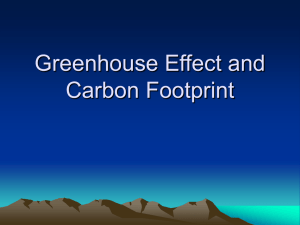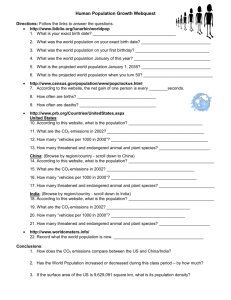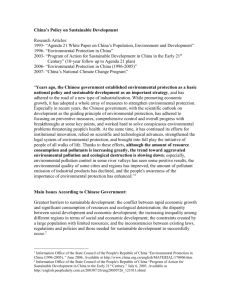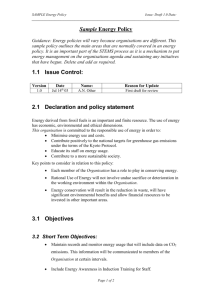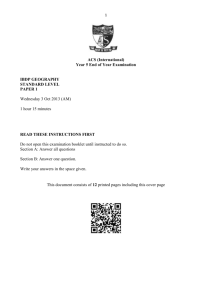Powerpoint
advertisement
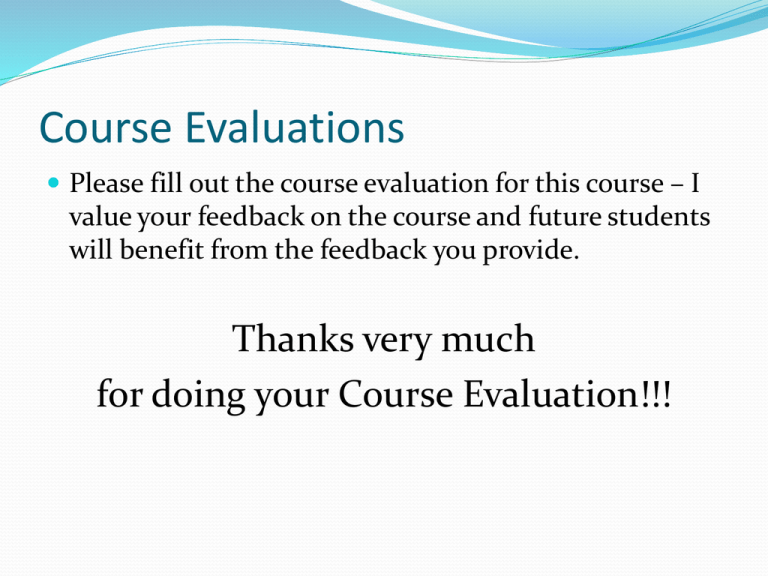
Course Evaluations Please fill out the course evaluation for this course – I value your feedback on the course and future students will benefit from the feedback you provide. Thanks very much for doing your Course Evaluation!!! Ideas from students in class Take public transportation (like EMX); bike don’t drive Bike 4/5 day to school and work. Haven’t driven truck in over a month Don’t even own a car Wash clothes only when needed Shower every other day and keep it short Tubes tied Eat low on intensity scale Buy used clothes and goods Ideas from students in class Pursue a career focused on reducing environmental degradation Created a group to plan action on environmental issues to connect university and society Educate myself Educate friends (Facebook) and the public Not eat meat Only using metal utensils and plates Unplug appliance cords when not in use Grow own fruits and vegetables Buy one natural soap for dishes, showers, washing hands and get in refills in bulk Ideas from students in class Accumulate experiences, not stuff Challenge people to think critically about climate change to create a more conscientious society Be involved politically: give public comments on EPA’s plans to reduce emissions on coal power plants Don’t use resource-intensive products like palm oil Keep heat and lights off during the day; use them sparingly the rest of the time Become more conscious of my habits, how they are linked to greater global habits, and how they effect climate change. Then try to change them Ron’s Ideas for Reducing Your Carbon Footprint Downsize your life Measure your monthly carbon footprint Spend your $ on experiences not things Consider having fewer or no kids Live near where you work Drive the speed limit Fix things and make things last Ideas for Reducing Your Carbon Footprint Don’t get the question wrong! Don’t ask: “how can I reduce my carbon footprint” Ask: “how can I live my life so the world emits less carbon” Do something political Do something social Do something economic Try to do more tomorrow than today: “get the trend right, not the level” Thanks to the following for their suggestions! Tobias Belschner, Berlin Graduate School for Transnational Studies Lena Bendlin, Free University Berlin Pam Chasek, Int’t Institute for Sustainable Development Radoslav S. Dimitrov, University of Western Ontario Navroz Dubash, Centre for Policy Research, New Delhi Ian Fry, Australian National University Christopher Gore, Ryerson University Rasmus Karlsson, Hankuk University of Foreign Studies Jeff McGee, University of Newcastle, Australia Peter Newell, University of Sussex Sebastian Oberthur, Vrije Universiteit Brussel Kate O’Neill, UC-Berkeley Jonathan Rosenberg, University of Alaska Jonas Schoenefeld, University of East Anglia Paul Steinberg, Harvey Mudd College Geoffrey Wandesforde-Smith, UC-Davis CO2 per dollar declining in all major countries Trends in global CO2 emissions: 2013 Report, PBL Netherlands Environmental Assessment Agency http://edgar.jrc.ec.europa.eu/news_docs/pbl-2013-trends-in-global-co2-emissions-2013-report-1148.pdf CO2 per person declining in US and Europe Trends in global CO2 emissions: 2013 Report, PBL Netherlands Environmental Assessment Agency http://edgar.jrc.ec.europa.eu/news_docs/pbl-2013-trends-in-global-co2-emissions-2013-report-1148.pdf Total CO2 declining in US and Europe Trends in global CO2 emissions: 2013 Report, PBL Netherlands Environmental Assessment Agency http://edgar.jrc.ec.europa.eu/news_docs/pbl-2013-trends-in-global-co2-emissions-2013-report-1148.pdf And we can REALLY make headway if we try (& Mass economy is growing) And we can REALLY make headway if we try (University of New Hampshire) And we can REALLY make headway if we try (Portland vs. US) These are total emissions. Per-capita emissions are 26% lower in 2010 than in 1990. http://www.portlandonline.com/mayor/?a=393835&c=49522 Some island states are adapting St. Vincent and Grenadines island of Bequia installs solar panels to power a desalination plant to avoid saltwater intrusion https://weadapt.org/knowledge-base/ecosystem-based-adaptation/special-programme-for-adaptation-to-climate-changespacc?utm_source=weADAPT&utm_campaign=e1f32e00f9Monthly+Newsletter&utm_medium=email&utm_term=0_be94db1743-e1f32e00f9-97775189 Germany renewables in use Clean-energy sources meet more of German electricity demand than any other source (Bloomberg news) Biggest German utility company to get rid of gas and coal plants and focus on renewable energy (Guardian) Renewable energy getting cheaper http://commons.wikimedia.org/wiki/File:Swansoneffect.jpg#mediaviewer/File:Price_history_of_silicon_PV_cells_since_1977.svg More renewable energy installed http://www.iea.org/publications/freepublications/publication/Wind_2013_Roadmap.pdf Americans Drive More Fuel-Efficient Cars and Drive Them Fewer Miles Source: http://www.umich.edu/~umtriswt/PDF/EDI_September-2012.pdf Batteries May Make Solar and Wind Energy Viable New battery technologies help overcome a major obstacle to renewable energy, by providing storage But also, innovation in running hydropower dams “backwards” with excess electricity from windmills to store energy http://www.ted.com/talks/donald_sadoway_the_missi ng_link_to_renewable_energy.html Low fuel plane design An MIT-led team designed an airplane estimated to use 70% less fuel than current planes (and reduces noise and nitrogen oxide pollutants too) http://web.mit.edu/newsoffice/2010/nplus3-0517.html International Cooperation is Succeeding at Fostering New Energy Technologies Research into generating electricity through fusion rather than fission is making steady, if slow, progress. Research supported through international cooperation of China, EU, India, Japan, Korea, Russia, and the US If successful, it is environmentally safe and offers a real alternative to fossil fuels http://www.iter.org/ International climate policy is improving US-China agreement, 2014 UNFCCC negotiations on a positive trajectory, with likely agreement in 2015 UNFCCC talks are “spreading influential ideas that alter cost-benefit calculations about domestic policy” (Dimitrov, 2015 “Climate Governance and UN diplomacy”) World Bank is halting financing of coal-fired plants More countries are regulating GHGs even without international rules More countries adopting climate legislation AND strategies: 67% of GHGs in 2012 (up from 45% in 2007) Including developing countries in Asia & Latin America UK climate change act (80% GHG reduction by 2050) Dubash, Hagemann, Hohne, and Upadhyaya, 2013, Developments in national climate change mitigation legislation and strategy, http://dx.doi.org/10.1080/14693062.2013.845409 GLOBE Climate Legislation Study, http://www.globeinternational.org/studies/legislation/climate http://www.qualenergia.it/sites/default/files/articolo-doc/IVCCL.pdf California prices carbon California adopts cap-and-trade system and first efforts at auctioning greenhouse gas permits goes smoothly and “prices” carbon http://www.sfgate.com/green/article/State-s-1st-carbon-auction-goes- smoothly-4051866.php Australia taxes carbon Australia legislated an economy wide carbon price. It started as a carbon tax in 2013 and will transition to an emissions trading scheme in 2015. Despite climate science skepticism, strong opposition from the conservative party and a powerful mining sector, the carbon tax has started with little harm to the economy and growing public acceptance http://theconversation.edu.au/explainer-australias- carbon-price-mechanism-in-six-dot-points-4230 Katrina vs. Sandy After Katrina, nobody talked about climate change After Sandy, mayor and governor of New York did talk about climate change LEED Buildings make rapid headway Leadership in Energy and Environmental Design (LEED) idea launched by Green Building Council in 1998 by group of “industry mavericks” US market for green building grew 50% during recession of 2008-2010 Over 30,000 LEED projects cover 1.6 billion square feet of commercial building space All new US embassies must meet LEED standards Paul Steinberg. 2013. Who Rules the Earth? How Social Rules Shape Our Planet and Our Lives Oxford UP German City Creates Energy Technology Park Covenant of Mayors: over 6,000 mayors have committed to meet or exceed EU’s 20% CO2 reduction objective by 2020 Gelsenkirchen Germany (an old coal, steel and glass industry city) set up energy technology park with help from European Union and set a voluntary carbon reduction target to go from “a city of a thousand furnaces to a city of a thousand suns” (Newell, Phillips, & Mulvaney Pursuing Clean Energy Equitably). Efforts to Address the Climate And Social Justice “Just Energy”: innovative collaboration of NGO, engineers, lawyers, academics, and consultants that is helping low-income communities in South Africa to provide "a fair return on renewable energy for local people and investors alike.“ http://just-energy.org/ Indonesian Islamic leaders preach conservation The Islamic Leader Forum for Environmental Care (FORDALING) argues that the Koran directly addresses the need to protect nature in Ayat-Ayat Konservasi (Islamic Verses for Conservation) and educated Islamic leaders to use sermons to promote nature conservation http://www.enn.com/wildlife/article/42391 NGOs can succeed in changing corporate policies Greenpeace pushes Lego to stop deal with Shell via Youtube video People are taking action Climate Heroes: Stories of Change 1:20-5:16 and 11:43-16:25 People starting movements Voluntary simplicity movement “Tiny House” movement Transition Movement: grassroots communities building community resilience in face climate change The Color of Glaciers

